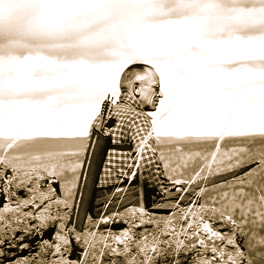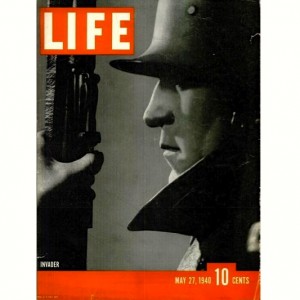Nostalgia's a window I won't look out_ Those stories just remind me What was undone then is undone now. And time is running down.
Home > Monthly Archives: August 2014
The year before his death in 1949, Aldo Leopold published A Sand County Almanac, a book to be read as much for its prose as its philosophy. Leopold’s writing is surpassingly fluent, leathery, vivid. A favorite passage: “One swallow does not make a summer, but one skein of geese, cleaving the murk of a March thaw, is the spring.”
Leopold called for a “land ethic,” an evolution of ethics that balanced the interests of the biotic community with human desires. He understood that the cultural values that underpinned public and private action had to be reworked if there was to be any hope of slowing the decimation of America’s wilderness.
Leopold sought not only to shape ethics, but aesthetics. He recognized a paradox at the heart of conservation—that the more people are drawn to the wilderness, the more they tread upon it. He advocated uses of the land that would enhance its admiration while leaving sufficient wilderness for study and preservation.
Today, the successes of American environmentalism are uneven. The law remains obsessed with land as commodity, held in fee simple absolute. Yet Leopold still amazes, with the equipoise of prose and the depth of his thinking.
But Aldo, the city suits me. I like the grit, salt dried streets, The natural wonder of girls going by_ hitch jackets. riding boots.
I walked away embarrassed. Can’t say why.
No partner in the history of Williams, White, Tearney, Case and Carver Ever slouched on a cement bollard At the doors of Paddington Station, Drank two pound Spanish red From a screw top bottle. Good chance that any lad Who ever did Never filed brief In the second circuit. And some blokes never leave their village. Some mice never leave their wall.
being_ something’s unbearable about it. not the lightness. my money’s on the lifting_ the space left by task, filled with decision.
INVADER. May 27, 1940. The caption overlays the image like a transparency, putting a meaning on it. The INVADER is a German soldier; he stands for strength and aggression. The date is a caption; this is before Pearl Harbor, before intervention, the Final Solution, before Normandy, the Bulge, before Dresden, before surrender, division, the Cold War, and all that followed. 10 cents is a caption—an economy, now quaint, wherein a thin dime still had value. LIFE is a caption, recalling an era when the magazine still commanded attention. Lastly falls this caption, and suggests that all that came before was what it was, but was also, however faintly, about meaning.
We hiked until our asses chapped, Sang jodies down the logging roads. Thin as fawns, green as ferns, Learning how to love.
Our old solid state hummed like a death ray warming up. I dashed to the kitchen to fetch a snack. The racket proceeded pictures and I caught a confrontation mid-stream as two jealous lovers volleyed threats in the living room. I stepped in just as the woman screamed, “Get out!” And followed her finger_ The cat lay swathed in afternoon on the window sill. //TELEVISION_4//
How can you swallow the antidote along with the poison_ To desire so much the end of your desiring?


